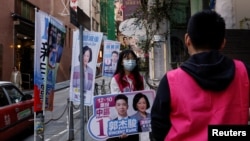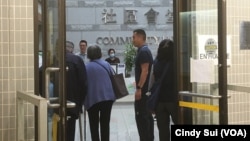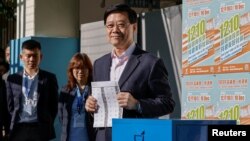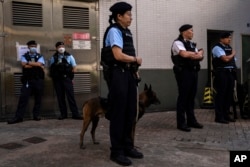Voter turnout was low Sunday in Hong Kong’s district council elections, the first since the electoral system was overhauled this year to restore order and reestablish control after widespread anti-government and pro-democracy protests in 2019.
Voters were either apathetic or boycotting the elections, which some people see as rolling back the city’s democracy.
By the time polling stations closed, the voter turnout rate was about 27.5%, much lower than during the last district council election in 2019, which saw a record high turnout of 71% by the time polling stations closed at night.
Under the new election rules, the number of directly elected representatives for the city’s 18 districts has been reduced from almost all, to only 88, 20% of the total 470. The remaining seats are appointed by Hong Kong’s chief executive, who is handpicked by Beijing, or selected by an electoral college, which is appointed by the government.
The candidates also must prove they are “patriots” and have to be nominated by government-appointed committees.
As a result, members of the remaining pro-democracy camp who are not in jail or have not left Hong Kong have been shut out because they could not get nominations from government-appointed committees, partly because of suspicions they are not "patriots." The parties had won a landslide victory, more than 80% of the seats, in 2019.
Three activists from the pro-democracy League of Social Democrats were arrested Sunday when they tried to protest against the election.
"Hong Kong people's right to vote and to be elected seems to be absent," Reuters quoted the group saying in a statement.
Hong Kong police said they detained them on suspicion of trying to interfere with the elections.
Three others were also detained on suspicion of inciting others online to boycott the elections or cast invalid votes.
Hong Kong Chief Executive John Lee defended the elections after casting his ballot, telling reporters that previous district councilors used their positions to promote Hong Kong’s independence from China and harm national security.
“In the past, we’ve experienced the Hong Kong version of color revolution, black-clad gangs, and others. I believe everyone could see the hurt, the destruction; it’s something that everyone had a hard time accepting,” Lee said. “This time we are ensuring these things will not happen again. We will ensure the district councilors elected will really serve everyone, and not betray the country, Hong Kong, the districts and our city’s residents.”
The government has tried to encourage a high voter turnout, including by holding an outdoor concert on the eve of the election, publicizing the importance of voting through videos, posters and radio announcements as well as songs and slogans, and by asking civil servants to vote.
It also offered subsidies for elderly care homes to help their residents to vote and set up polling stations near mainland China to make it easier for Hong Kong residents living across the border to vote.
However, voter turnout is expected to be low either due to voter boycott or apathy, according to analysts.
Political commentator Sonny Lo said the election results -- namely the voter turnout -- will be a good indicator of whether people support the government’s actions since the end of the protests and passage of a controversial sweeping national security law.
“It seems the public of Hong Kong are divided into two major groups, one politically apathetic, the other one more enthusiastic,” Lo said.
Some voters told VOA they wanted to show support for the government for restoring order to a Hong Kong made chaotic by weeks of debilitating protests.
“For me, I never voted in the past over the 40, 50 years living in Hong Kong. This time, I came out to vote to show my support to the current government as they are really doing a good job for the people,” said Ming Chan, a retiree. “All my girlfriends are saying we must vote today. We're circulating this on WhatsApp. It never happened before, saying we must vote.”
Chan described being “scared, afraid” during the weeks of protests when subway stations were smashed and streets were blocked.
“We were not safe, and this is actually for the first time in my life in Hong Kong that I had to feel that. … Peace, rules, law and order, every good citizen should abide by the rules of society and all those were devastated,” she said.
Others said they saw no point in voting, since the candidates were all vetted by government committees.
Mary Cheung, a salesperson in her 30s, said voting for candidates pre-approved by the government and not being able to vote for the pro-democracy candidates she prefers is not the same as having a choice.
“Some people think having a vote is better than nothing. I think it’s a waste of my time to vote because it’s not the people I like,” Cheung said.
Asked if she thinks Hong Kong’s democracy will be curtailed because of the electoral reforms, she said,” It’s already regressed.”
“There’s nothing we can do. The sense of feeling helpless is very strong,” said Cheung.
However, Singh Baljinder, a Sikh born and raised in Hong Kong who is running for election for the first time, said there is real value in the district council elections because if he is elected, he can represent Hong Kong’s ethnic minorities on a host of pressing issues, from lack of employment, to difficulties learning Chinese and insufficient ethnic minority social workers.
“Most of my friends, they’ve left Hong Kong because they couldn’t see any future for their kids, because of the language barrier and difficulty getting jobs after they graduate,” Singh said. “We are trying very best to make them stay because if we are more involved with the government, when they see us involved, they will have trust and they will have someone as a leader to represent them.”
“I'm a Punjabi Indian; for many years even before 1997, there was no Punjabi who stood up in district elections, so this will be a history-making election for us,” he said.













